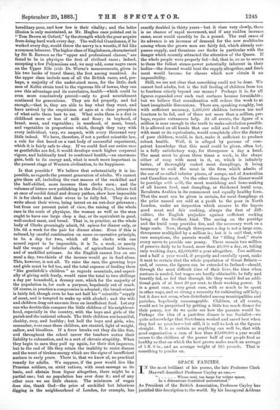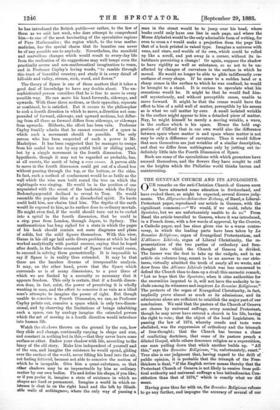SPACE FANCIES.
IN the most brilliant of his poems, the late Professor Clerk Maxwell described Professor Cayley as one,—
Whose soul, too large for vulgar space, In n dimensions flourished unrestricted."
As President of the British Association, Professor Cayley has justified this description to the world. By his Inaugural Address he has introduced the British public—or rather, to the few of them as we said last week, who dare attempt to comprehend him—to one of the most fascinating of the speculative regions of Pare Mathematics ; the region which, to the true mathe- matician, has the special charm that its beauties can never be of any possible use to anybody. Nevertheless, the manifold and marvellous changes which would result to every-day life from the realisation of its suggestions may well tempt even the practically severe and non-mathematical imagination to roam, and in Professor Cayley's loving words, "to ramble through this tract of beautiful country, and study it in every detail of hill-side and valley, stream, rock, wood, and flower."
The theory of Space is one of those matters that it takes a good deal of knowledge to have any doubts about. The un- sophisticated person considers that he is free to move in every possible way. He can move his hand forwards, sideways, and upwards. With these three motions, or their opposites, separate or combined, he is satisfied. But it occurs to the philosopher to seek a fourth direction in which to move, a direction not com- pounded of forward, sideways, and upward motions, but differ- ing from all these as forward differs from sideways, or sideways from upwards. Hitherto, the effort has been vain. Professor Cayley frankly admits that he cannot conceive of a space in which such a movement should be possible. The only person who has been suspected of such a power is Mr. Maskelyne. It has been suggested that he manages to escape from his sealed box not by any artful trick or sliding panel, but by a simple movement in the fourth dimension. This hypothesis, though it may not be regarded as probable, has, at all events, the merit of being a vera causa. A person able to move in the fourth dimension could get out of a closed box without passing through the top, or the bottom, or the sides. In fact, such a method of confinement would be as futile as the well which the wise men built round the tree on which the nightingale was singing. He would be in the position of one acquainted with the secret of the backstairs which the Fairy Bedonebyasyoudid declined to reveal to Tom. He would resemble the popular idea of a disembodied spirit. No knots oink' hold him, nor chains bind him. The depths of the earth would lie exposed to him, as its surface does to ordinary mortals. He might even find, if the world should turn out to be curled into a spiral in the fourth dimension, that he could in a step pass from London, through Japan, to Sydney. The mathematician has long sighed for a state in which the pages of his book should contain not mere diagrams and plans of solids, but the solid figures themselves. With this view, Gauss in his old age laid aside divers problems at which he had worked analytically with partial success, saying that he hoped after death, in the fuller command of Space that would ensue, to succeed in solving them geometrically. It is impossible to say if Space is in reality thus extended. It may be that these are the baseless dreams of irresponsible analysis. It may, on the other hand, prove that the Space which surrounds ns is of many dimensions, to a poor three of which we are limited by a necessity so necessary that it appears freedom. This only is certain, that if a fourth dimen- sion does, in fact, exist, the power of perceiving it is wholly wanting in man, and the effort to conceive it as vain as a blind man's attempts to imagine the power of sight. But though unable to conceive a Fourth Dimension, we can, as Professor Cayley points out, conceive a space which is only two-dimen- sional, and by observing the limitations of beings inhabiting such a space, can by analogy imagine the extended powers which the art of moving in a fourth direction would introduce into human life.
Watch the shadows thrown on the ground by the sun, how they slide and change, continually varying in shape and size, and constant in nothing but in this,—that they never leave some surface or other. Endow your shadow with life, according to the fancy of the old story. Make him independent of yourself and of the sun, and imagine the existence he would spend, gliding over the surface of the world, never lifting his head into the air, not feeling fettered, because not able to conceive the motion of which he is incapable. Give him a quasi-substance, so that other shadows may be as impenetrable by him as ordinary matter by our own bodies. Fix and define his shape, if you like; or if you prefer it, imagine a state of existence in which no shapes are fixed or permanent. Imagine a world in which ex- istence is shut in on the right hand and the left by illimit- able walls of nothingness, where the only way of passing a man in the street would be to jump over his head, where books could only have one line in each page, and where the Morse Alphabet would be the only admissible form of writing, for even to cross a g would make a projection from the page like that of a book printed in raised type. Imagine a universe with suns, and stars, and worlds of its own, which could be rolled up like a scroll, and put away in a corner, without its in- habitants perceiving a change ! Or again, suppose the shadow to have rigidity as well as substance, so as not to be un- affected by changes of curvature in the surface in which he moved. He would no longer be able to glide indifferently over surfaces of every shape. If he came to a sudden bend or a sharp crease in the surface to which he was confined, he would be brought to a stand. It is curious to speculate what his sensations would be. It might be that he would find him- self mysteriously, and without perceptible cause, unable to move forward. It might be that the crease would have the effect to him of a solid wall of matter, perceptible by his senses as is what we call matter by ours. A small isolated wrinkle in the surface might appear to him a detached piece of matter. Nay, he might himself be merely a moving wrinkle, a wave, in the surface which is his space. Hence the bold sug- gestion of Clifford that in our own world also the difference between space where matter is and space where matter is not may be only a difference of curvature. Thus it would follow that men themselves are just wrinkles of a similar description, and -that we differ from nothingness only by jutting out in- definitely little into the Fourth Dimension of Space.
Such are some of the speculations with which geometers have amused themselves, and the flowers they have sought to cull on the heights which the Philistine world thinks barren and uninteresting.



































 Previous page
Previous page